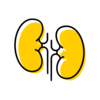Research


Vice Chair for Research
The Department of Medicine has a long tradition of conducting rigorous and groundbreaking biomedical and clinical research. We foster a departmental culture that prizes scientific pursuit and a deep commitment to nurturing physician scientists. Nearly half our faculty engages in research in a wide variety of areas that includes diabetes, lymphoma, inflammation, viral pathogenesis, bio-defense, epithelial biology, gene therapy, vascular and myocardial biology, antibiotic resistance, clinical trials, and health services research. We invite you to explore these pages to learn more about the exciting discoveries continually being made in Internal Medicine.
Recent Publications
Explore this robust database provided by Iowa Research Online (ORI)
Research Resources
Department contacts, website design, and department and University resources.
Research Day
Our annual research event with internal and external presenters and a poster session!
Centers, Programs, & Institutes
Much of the research conducted at the College is interdisciplinary and collaborations are fostered and coordinated through core research facilities, institutes and major research centers.
Research Centers
- Advanced Pulmonary Physiomic Imaging Laboratory
- Center for Bioinformatics and Computational Biology
- Center for Gene Therapy of Cystic Fibrosis and other Genetic Diseases
- Cystic Fibrosis Research Center
- François M. Abboud Cardiovascular Research Center
- Fraternal Order of Eagles Diabetes Research Center
- Helen C. Levitt Center for Viral Pathogenesis and Disease
- Holden Comprehensive Cancer Center
- Viral Vector Core Facility
Research Programs
Internal Medicine Affiliated Training Grants
The following training grants are currently active in the Department of Internal Medicine at the University of Iowa:
Program in Hematology: Molecular and Cell Biology Blood Cells
Program Director: Steven Lentz, MD, PhD
Project Number: T32 HL007344
Title: Program in Hematology: Molecular & Cell Biology of Blood Cells
Center Goals: This training program has as its primary objective to prepare young scientific investigators for productive careers in academic hematology. There is a particular need to expand the number of scientists and physician-scientists trained in research in the field of hematology because of its direct relevance to some of the most common human medical conditions, including abnormalities of immune cells, vascular diseases, disorders of blood clotting, and cancers of blood cells.
About the Fellowship: The program has as its primary objective to prepare MD, MD/PhD, and PhD postdoctoral fellows for productive careers as academic scientists and physician-scientists. The focus of training supported by this grant remains within the scientific discipline of hematology. An evolving feature of the training program is an expanded emphasis to provide training opportunities in translational research. The training will be carried out in an enriched environment of active basic and clinical investigation at an institution that emphasizes the career development and collaborative science.
The specific objectives are:
- To identify and recruit outstanding postdoctoral trainees, inclusive of gender, ethnicity and culture, who wish to obtain comprehensive knowledge of the principles and techniques of basic and translational research related to hematology, blood cells, vascular biology, coagulation, or hematological malignancies;
- To attract highly motivated scientists and physician-scientists and provide them with comprehensive instruction in the design and implementation of high quality research projects, including participation in cross-disciplinary research teams;
- To train physician-scientists for academic careers in hematology and related scientific disciplines and prepare them for successful transition to independent investigators; and
- To expose talented PhD scientists to the field of hematology and train them for careers as independent investigators.
Since the last renewal, the training program has undergone a transition to an expanded leadership team and several new initiatives have been instituted. These include the establishment of mentoring committees and individualized development plans for all trainees, an expanded emphasis to provide didactic and mentored training opportunities in translational science, and the implementation of several new strategies to improve community among trainees. The rich training environment provided by the diverse faculty, extensive laboratory, clinical, and core facilities, and strong institutional support should ensure continued success in attracting and preparing highly qualified postdoctoral trainees for careers in academic hematology.
For more information contact Dr. Steven Lentz
Research Training in Infectious Diseases
Program Director: Jack Stapleton, MD
Project Number: T32 AI007343
Title: Research Training In Infectious Diseases
Center Goals: Human suffering due to infectious diseases is widespread, both due to the constant endemic diseases and emerging infectious diseases that can reach epidemic proportions. This program is designed to train biomedical and physician biomedical scientists in the most recent advances in basic and epidemiological sciences, in order to prepare them for productive career in all aspects of Infectious Diseases research.
About the Fellowship: The program, whose research emphasis is on the interface between human host and microbial (bacterial and viral) pathogens, provides an intense mentored research experience for MD and PhD postdoctoral trainees in infectious diseases. This occurs in conjunction with an individualized curriculum of didactic courses, seminars and journal clubs designed to encourage substantive interactions between MDs and PhDs. A short- term 3-month research experience for medical students is also offered. Most faculty are drawn from 1 basic science and 2 clinical departments, as well as 2 interdisciplinary PhD programs. Collaboration among program faculty is high. Research facilities are superb.
The scientific program centers around three major areas:
- Host Defense, emphasizing innate immunity;
- Bacterial Pathogenesis; and
- Viral Pathogenesis.
Faculty are divided into: 1) full members; and 2) associate members; on the basis of their extramural research support and their experience both as an independent investigator and research mentor. Primary research mentors come from faculty meeting the criteria for full membership. An important aspect of the 3-year research experience for MD postdoctoral trainees with minimal prior research experience is an intensive exposure to a broad spectrum of graduate level basic science courses. All postdoctoral trainees establish a Research Advisory Committee. All trainees attend a research conference, as well as a seminar/ journal club designed to encourage cross-fertilization of ideas and scientific approaches between clinical medicine and basic science. They will interact with outstanding visiting scientists, attend scientific meetings, learn scientific writing and grant preparation skills, and complete a course in research and biomedical ethics. A recruitment program for minority trainees is in place and is being further expanded. In summary, this proposal requests continuation of an ongoing training program with an excellent training record which will provide a coordinated and integrated training experience for postdoctoral MD and PhD trainees in infectious diseases research related to the microbial pathogenesis of bacterial and viral infections of humans
For more information contact: Dr. Jack Stapleton or Dr. Lee-Ann H. Allen.
Training in Mechanisms of Parasitism
Program Director: Mary Wilson, MD
Project Number: T32 AI007511
Title: Training in Mechanisms of Parasitism
Principal Investigators: Mary E. Wilson, MD, and Patrick M. Schlievert, PhD
Goals of the Training Plan: This proposal is based upon the hypothesis that the mechanisms through which pathogenic microbes invade and elicit disease in mammalian hosts, and responses of the host to these microbial pathogens, will share common features between microbes from different phyla, i.e., protozoa, helminths, bacteria, and viruses. A corollary is that the same technology can be applied to investigations of microbial virulence/host responses to different pathogens. As such, an integrated approach to these host-parasite interactions will enhance progress in each individual field. Our experience through this training program has shown that not only is it beneficial to foster these interactions at the level of the principal investigator, but that interactions promoted at the trainee level also “trickle up” for the benefit of the mentors.
According to the above hypotheses and observations, the goals of the program are: (1) to foster collaborations among scientists and trainees with expertise in complementary disciplines; (2) to encourage trainees to take advantage of the expertise of faculty members in diverse fields; (3) to ensure that trainees are well informed of new advances in technology and their applications to biological questions; (4) to foster interactions among graduate students, PhD postdoctoral fellows, and MD fellows in different laboratories; and (5) to carefully monitor the progress of trainees so that their learning and productivity are maximized.
About the Fellowship:
- Funded since 1996.
- Currently supporting three predoctoral students (combined M.D./Ph.D. or Ph.D. only) and four postdoctoral fellows.
- Trainees participate in:
- Seminars
- Journal clubs
- Annual retreat
- Career development
- Grant-writing
- Graduate courses
- Bench research
- Major contributing departments and programs:
- Microbiology and Immunology
- Internal Medicine
- Pediatrics
- Epidemiology
- Biomedical Engineering
- Inflammation Program
- Applications are requested in April of each year and new trainees are appointed on August 1.
For more information about the grant and information on how to apply contact: Angie Robertson (angie-robertson@uiowa.edu).
*Eligibility
Support provided for predoctoral students (PhD or MD/PhD) and postdoctoral scholars. Trainee appointments must meet the eligibility requirements set by the funding organization, be mentored by a faculty member/preceptor participating in the training program, and be chosen through the individual training program’s selection process.
Research News
Sadasivam joins ALA team to investigate lung cancer immunotherapy
Eliminating treatment barriers with theratyping
Robinson investigates how care models influence incretin therapy outcomes
Henry awarded AHA Predoctoral Fellowship
Budnik, Jha earn AHA postdoc research awards
ASCI recognizes Cook with Young Physician-Scientist Award
Zaher awarded ADA Postdoctoral Fellowship to advance beta cell research
Fleege recognized with dual career development awards
Robinson highlights association between weight stigma and healthcare avoidance
Pereira receives Carver Trust grant to investigate interplay between adipose tissue and heart health
Iowa Living Human Heart Program debuts website to accelerate translational cardiovascular research
University of Iowa physician–scientist receives prestigious Lasker Award
Investigators and Research Groups
Visit laboratory websites in the following specialty categories:
New Funding Awards
July-August 2025
New Federal Awards
| Anil Chauhan | NIH R01 4 years | Metabolic reprogramming in experimental deep vein thrombosis and resolution |
| Anil Chauhan | NIH R01 4 years | Regulating Cellular Metabolism and Energy Flow to Target Thrombosis |
| Christina Cho | DoD 2 years | Spatial Proteogenomics to Identify Novel Prognostic and Predictive Biomarkers in Melanoma |
| Barry London, (MPI) Bryan Allen, (Contact PI) | NIH R21 2 years | Using a Superoxide Dismutase Mimetic to Mitigate Age-Associated, Radiation-Induced Cardiopulmonary Damage: Investigating the Role of Nitro-Oxidative Signaling and Mitochondrial Metabolism |
| Nicholas Mohr (Contact PI) Brett Faine (MPI) Heather Reisinger (MPI) | NIH R01 4 years | Characterizing a High-Reliability Implementation Program for Sepsis: Sepsis Tools AND Accurate Reporting of Outcome Differences (STANDARD) Study |
| David Stoltz | NIH P01 5 years | Pathogenesis and Therapeutic Approaches in Primary Ciliary Dyskinesia |
| Ling Yang (Contact PI) Long-Sheng Song (MPI) | NIH R01 4 years | Shaping Cardiac Immuno-metabolic Homeostasis by the Lysosome |
Competitive Renewal
| Amy Ryan | NIH P30 5 | Precision Medicine Center for Cystic Fibrosis |
Other Awards
| Mark Burkard | Scorpion Therapeutics, Inc. 3 years | First-in-Human Study of STX-478, a Mutant-Selective PI3Ka; Inhibitor as Monotherapy and in Combination With Other Antineoplastic Agents in Participants With Advanced Solid Tumors |
| Tara Graff | BeiGene USA, Inc. 4 years | Bcl-2 Inhibitor BGB-21447 in Patients With Mature B-Cell Malignancies |
| Tara Graff | Genentech, Inc 2 years | Adding Venetoclax to patients on Covalent BTKI for 1L CLL can achieve deep durable remissions (by uMR 10-4) to allow off-treatment period |
| Steven Polyak | Sanofi US Services, Inc. 3 years | SAR442970 in adults with moderate to severe Crohn's disease |
| Steven Polyak | Sanofi US Services, Inc. 3 years | SAR442970 in adult participants with moderate to severe ulcerative colitis |
| Hanna Zembrzuska | Resolve Therapeutics, LLC 3 years | Intravenous RSLV-132 in Participants with Sjogren's Syndrome (SS) with Moderate to Severe Symptom Burden |










